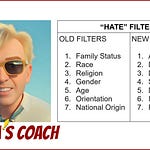This episode of America’s Coach is a no-nonsense deep dive into the housing crisis, the myth of homeownership as a universal right, and the harsh economic realities facing young Americans. Host Mark Whitney contrasts his first $60,000 home with the $2.6 million median price tag in his current zip code, showing how zoning laws, scarcity, and elite gatekeeping have made homeownership nearly impossible for most. But he offers a solution: move to a wealthy zip code, start a service business, and build wealth by serving high-income residents. It's equal parts economic reality check and motivational kick in the ass for anyone ready to change their circumstances.
Show Notes — America's Coach (June 20, 2025)
Recorded Live In San Diego, CA · 9:00A Pacific
Theme: Juneteenth
“It’s not that you own a home. It’s where you own a home.”
“If your parents already own in the right zip code, you were born a millionaire.”
“ChatGPT ain’t gonna fix your plumbing.”
Key Topics Covered
The Housing Crisis Deconstructed
Is housing a right? A breakdown of the political argument.
Why most Americans, especially under 40, are priced out.
How local zoning laws intentionally limit supply.
The Geography of Wealth
It’s not if you own your home. It’s where you own your home.
Why scarcity in desirable zip codes like 92130 drives exponential equity.
Introduction to 92067 (Rancho Santa Fe): where the landlords live.
A Playbook for the 25-Year-Old You
Leave your hometown.
Move to a wealthy, graduate-degree-dense zip code.
Start a service business (plumbing, electrical, property management, etc.)
Build to $500K+ annual income and qualify for high-equity homeownership.
Real Talk on Equity and Family Formation
How bedroom count influences birth rates.
Why “van life” and “tiny homes” are not viable wealth-building strategies.
YouTube Minimalism vs. Generational Legacy.
Actionable Takeaways
Don’t buy a house for just lifestyle—buy it for location and leverage, too.
Target zip codes with high concentrations of professional degrees.
Service industries remain AI-proof and lucrative in wealthy enclaves.
Generational wealth is built through ownership and systems, not jobs.
UNOFFICIAL TRANSCRIPT (video is authoritative)
OPENING BILLBOARD · HOUSE ANNOUNCER, SHADOE STEVENS
Ladies and gentlemen, from San Diego, California, Mark Whitney!
COACH
Here we go. Fade up. Good morning, everybody. My name is Mark Whitney. This is America's Coach for Friday, June 20th, 2025. It is 66 degrees, mostly sunny here in beautiful San Diego, California. The name of today's show: Red, White and Screwed. We're going to talk about homeownership. Is housing a right?
We have a bunch of people here in California in the legislature who think housing should be a right. Do you think housing should be a right? We're going to talk about that today.
You know, there are two kinds of people, I think—two kinds of people in the world: people who have a system, and people who are broke. And as America's Coach, I think it's my job to come in here every day and introduce a problem and propose a solution. Now, the solution may not be for everybody, but there will be a solution to the question of how to buy a home.
Nobody can buy a home right now. Almost nobody. And I want to talk about that, because this is the biggest issue on people's minds that nobody is talking about in a way that makes any kind of sense. The audience I have in mind for today's show—for today's half hour—is me at age 25. I'm 66, so the audience I have in mind is me 40 years ago.
Let me tell you where we're going to start. This is a picture of the first home my wife and I bought. It was new construction when we bought it in Manchester, New Hampshire, 41 years ago. You can see the Zillow estimate is about half a million dollars for this home. And Zillow is usually a little low. I own a brokerage, so I know what I'm talking about. We didn't pay $60,000 for it. We put down $12,000 and financed $48,000.
Today, it's worth half a million dollars.
By the way, if you're listening on audio podcast, get over to americascoach.com, subscribe for free, and every time we upload a new episode, you will feel a vibration in your pants. But more than that, you'll be able to watch the video and see the visuals.
So that home—we don't own it anymore. We sold it after a couple of years. Was that a mistake? It was not. The reason I'm showing you that home is because today I want to talk about—it’s not that you buy a home. It’s where you buy a home.
That home we bought in Manchester, New Hampshire—we bought it when I was building my advertising agency in Vermont, which was about an hour and a half north. And then three or four days a week, I was working at a TV station in Boston, which was 75 minutes to the south. So we bought that home because it was in the middle. Before that, we had just rented.
My parents never owned a home. I was the first one in my family to be involved in owning a home. My wife's dad hardly ever rented. He built his first house and just owned it. I don't think he ever had a mortgage. He just kept flipping them over. And he was not a fancy guy—he just worked for the government, was in the service—but he managed his money.
But again, the point: it's not that you own a home—it's where you own the home. So that home that sold for $60,000 and now requires $100,000 down to get the keys—that was 41 years ago.
That home appreciated only at a rate of 5% a year. We could have done almost anything else with our money. We make our money by running businesses, not by owning a home. But you can build your net worth by owning a home—just not in Manchester, New Hampshire.
So, a few years later, we bought a home in Norwich, Vermont. We built that home on 10 acres of land. Norwich is a very exclusive little town, a bedroom community of Dartmouth College. We bought the land for $35,000, and I had a logger come in and clear-cut three acres. We got $10,000 for the wood, so we netted the land for $25,000.
Here's my point. I mentioned at the outset of the show: we have some folks in California who say housing is a right. They want to pass a law out here—actually, they tried and failed—but they still want to pass a law that says housing is a right. Like you have the right to remain silent, the right to free speech, the right to an attorney—they want a right to own a home written into the Constitution.
I don’t know about that.
Owning a home has been the number one way to build some net worth in the United States. Now, if you watch Ken Burns' documentary about the Native Americans who were here before us, the whole concept of owning the land was foreign. The idea was that everybody just shared the land, lived off the land, and the land would provide. I think that ship has sailed.
So you've got your "housing is a right" people—and then you have the people who think you should probably be able to own a home. Citibank says that 67% of people have given up on owning a home.
Back to Norwich. The guy who sold his farm and split it into 10-acre parcels—he had to do that. He couldn’t split it into 1-acre parcels. We only needed an acre, but we had to buy 10 acres. That’s how they keep the riffraff out. You want to come to this little town? It's already built out. Main Street is built out—single-family zoning, historic homes on half-acre and three-quarter acre lots. When you replace the windows, they have to be 12-over-12 panes. You can't just throw in some vinyl windows. Everything’s regulated.
So if you want to introduce something new and risk changing the character of the town, you're going to have to do it in 10-acre parcels. We had to buy 10 acres even though we didn’t need it. We clear-cut three acres, turned two acres into a lawn, and our house sits right in the middle of that. You could argue that the other eight acres are going to waste—eight acres that could host more families. But the town says no.
And again, this is a bedroom community of an Ivy League town. They vote 85% Democrat. I’m not Democrat or Republican. I’m not taking a shot at them. I’m making a point about why we have a so-called housing crisis.
A lot of places are built out by design. There’s no place to build, because the people who already live there intended it that way.
If you're fortunate enough to be 25, and your parents own one of these homes, and you're a single child—you’re going to inherit that home. You’re good to go. You were born a millionaire.
If you're not so lucky, like my wife and I starting out, you’ve got to scrape together $12,000 to get your first place. Now, it’s out of control.
You hear about tiny houses—like jail cells, right? You see YouTube videos about van life. “Hey, look at me living in my van!” That’s fun for about an hour.
Citibank says 67% of Americans think homeownership is unrealistic. I disagree.
I'm going to show you where I live now and tell you how you could live here, too—own here, and afford it. It might not be your cup of tea, but as America's Coach, it’s my job to offer a solution.
What prompted this episode isn’t just that there’s a legitimate housing crisis—it’s that there’s a big, beautiful bill being discussed. We’ve got the “housing is a right” people, mostly progressive, AOC-type folks. And then we have this big, beautiful bill that wants to privatize millions of acres of federal land.
And the last people to think that’s a good idea? The “housing is a right” people.
But here’s the thing: if you want housing to be a right, you need a place to build housing.
Where I live, coastal California—everything is built out. What happens when something is scarce? The price goes up.
Let me show you what I mean. Look at 92130 on Zillow. That’s Carmel Valley in San Diego. In 2019—pre-COVID—the median sale price for a single-family home was $1.3 million.
Fast forward to 2025? $2.6 million. Doubled.
In May 2019, you’d need $260,000 down, and your monthly payment would be about $6,000. In 2025? That same house is $16,000 a month.
What do those homes look like? All basically the same. About 20,000 homes in 92130—variations on the theme, built by two or three developers. Two miles from Torrey Pines State Beach. Gorgeous. Schools are incredible.
So why can't you buy there? It’s not about money. It’s about scarcity. Homes sell once every 20 years.
That Manchester home? Nice little house. But as an investment? Horrible.
You don’t have to choose between a place to live and a great investment. In Southern California, you can have both. I wish I’d known about it before I was 40.
And here’s the kicker: you’re surrounded by other successful people. This is a global destination.
So let’s assume you can buy a home. I’ll tell you how.
You might have to leave your loser hometown. The people who don’t want to change. The people who are staying the same. That might be the hardest part—turning your back and walking away.
But once you do? Go to the U.S. Census. Find areas with a high percentage of people with graduate degrees. 30% or higher. That’s your metric.
That’s where you’ll find high-value homes and equity growth. Buy one and never sell it.
92130 has 20,000 homes. 40% of them are rentals. Who owns those? The people in 92067—Rancho Santa Fe. Only 1,000 homes. Median price? $5 million.
When a home does go up for sale there, it sells for cash. My business partner recently helped a buyer win a deal with 29 offers. Two were cash. Ours wasn’t. But she used training to win that deal. Because the seller believed we would close.
Arnold Schwarzenegger owns a house up there. These folks collect houses like trinkets. Some own 5, 6, 7 homes in 92130.
Both of these zip codes—and mine, 92014—rank top five in California for percentage of graduate degrees. I have a high school education. But one of my companies serves these folks.
So how do you do it?
Move to a zip code with a high concentration of professional degrees. Start a service business. Electrical. Plumbing. Property management. Contracting.
In a short time, you’ll make half a million dollars a year. Then you’ll qualify for that home in 92130.
You’ll have a place to live. You’ll benefit from future equity. You’ll leave it to your kids. Everyone wins.
We’re not replacing ourselves. My wife and I graduated high school with 900 students. Now? That school has 450. There’s a direct link between the number of bedrooms people can afford and the number of children they have.
You don’t need a tiny house. You don’t need van life.
ChatGPT isn’t going to wire a home. Or plumb it. Or roof it. Or build solar.
There are 20,000 homes in this one zip code. They all need services. They pay for services. They overpay for services.
When you own a business like that, your credit cards are different. You get points. My youngest son had the most Discover points in the country at one point. Lived off them. Traveled the world.
The U.S. was invented for real estate ownership and small business. That’s the system. Not jobs. Systems.
And what I described? Anybody can do it. You don’t need a fancy degree. You just need to move to the right zip code. The rest will take care of itself if you’re willing to work.
That’s America’s Coach for today. My name is Mark Whitney. We’ll see you back here Monday morning, 9 a.m. We're here Monday through Friday at 9 a.m. with the livestream. Then we upload it later so you can watch on demand.
America’s Coach Live. See you next time. Take care.
CLOSING BILLBOARD · SHADOE STEVENS
Keep Banging!
Music











